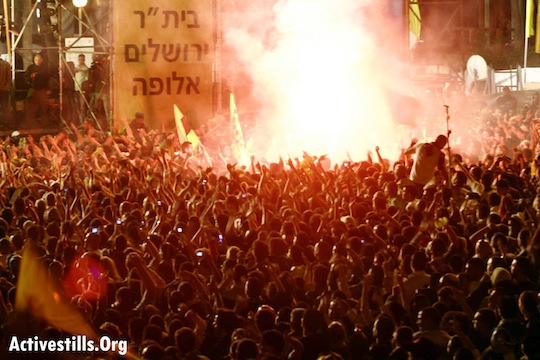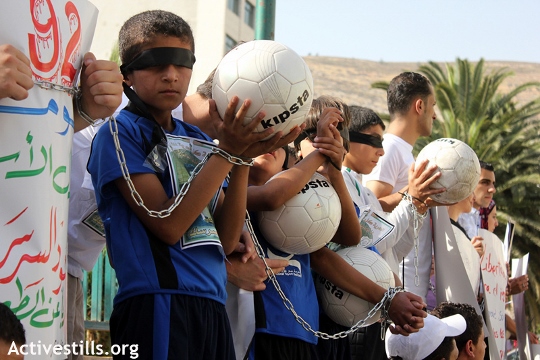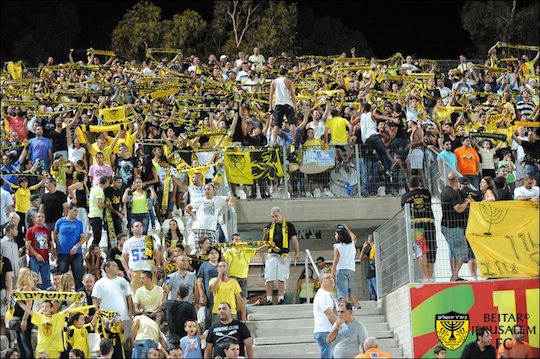It is incomprehensible that one of the premier clubs in Israel doesn’t allow Arab players — because they are Arab.
By Asaf Marziano

The head of Palestinian Football Federation, Jibril Rajoub, is attempting to have Israel expelled from FIFA, soccer’s international governing body. The topic has been making headlines in Israel and internationally in recent weeks, coinciding with a visit to the region by FIFA President Sepp Blatter last week.
Despite attempts by Israel, and Blatter, it seems that Rajoub’s initiative might bear fruit. The topic will come up for a vote in FIFA on Friday.
Rajoub’s stated reasons for wanting to expel Israel from the soccer association are based, among other things, on the fact that Israel often prevents athletes from Gaza — including soccer players — from taking part in sporting events in the West Bank. A prime example of this was when the Israeli government forbade Gazan runners from participating in the Palestine Marathon in Bethlehem in recent years.
Rajoub’s campaign evoked a chorus of reactions in the Israeli media. But don’t let the diversity of nay-sayers fool you: the central argument was monotone and one-dimensional. The topic was presented as a struggle between political forces — a new venue for confrontation among technocrats, bereft of any substantive arguments that get to the root of the issue. This goes for Hebrew-language Israeli media outlets like Ynet, Sport 5, One and NRG.
Even Haaretz dedicated a column to the issue earlier this month, in which Uzi Dann provided a similar point of view. He pondered why the Israeli government doesn’t exert its power at the highest political levels in order to solve this issue before it becomes a tidal wave.
At a certain point, Dann notes that the only country to ever be kicked out of FIFA was South Africa, during apartheid. For a moment it seemed like it was finally OK to make the comparison, but Dan immediately added: “True, it’s not the same thing, but it shows how difficult Israel’s situation is.” This is, not morally but pragmatically.

Sports commentator Ouriel Daskal suggested a different approach in a column published in the blog Soccerissue. Daskal makes clear that he is a leftist on every other day of the year, but that everything has red lines. He asks, how dare Rajoub exploit the sport in such a cynical fashion — after all, what do sports have to do with politics? He also condemns FIFA’s treatment of Israel based on the logic of, “why are they allowed and we aren’t?”
After all, athletes and civilians are harmed in other places, so why is the focus only on Israel? From here, the road to “everyone is anti-Semitic” isn’t very long. The transition from discriminators to discriminated is complete.
Israeli sports commentators’s blind spot, it seems, lies exactly at the point where we go from oppressed to oppressors: the moment when the media is asked to critique our own actions in the exact same way it critiques actions taken against us. This transition is often missed by the media.
The issues that are out in the open and visible to anybody — (Palestinian) athletes forbidden from taking part in athletic competitions — are never even brought up.
The case of Beitar Jerusalem
In this context, one cannot avoid talking about the Beitar Jerusalem soccer club, and the way the Israeli sports media talks about it.
Beitar Jerusalem is a premier soccer club in Israel that has a real chance of playing in one of the European tournaments next year, and which does not allow Arab soccer players on the team — because they are Arab. This fact alone is nearly incomprehensible.
The Israeli Football Association should be commended for penalizing the team recently after repeated expressions of racism by its fans, but one must wonder about the timing of the move, considering Blatter’s visit and the upcoming FIFA vote.

Meanwhile, the media continues to provide a shallow, trivial and regressive point of view.
For example, during a match between Beitar Jerusalem and Ironi Kiryat Shmona a little over a month ago, Beitar’s fans hurled racist epithets at Kiryat Shmona’s Ahmad Abad. After he scored a dramatic winning goal, he made a finger gesture at the Beitar fans, which only led to more racist slurs yelled at him.
The next day, the sports media talked about how a player who was humiliated for the duration of an entire game pointed his middle finger at the crowd. Abad quickly released an apology to the press.
The media portrayed Abad’s act as leading to the uproar, which could have been easily avoided had he refrained from acting in such a way.
Moreover, it seems that the media’s discussion of racism has somehow been merged with a wider struggle against violence in sports. Despite the fact that violence is an essential component of both, there is still a crucial difference between the two. This merger, which exists in Israel’s sports media, turns racism into just another form of trivial violence — to the degree that violence can be trivial — and one that makes invisible the significant characteristics of racism. This, in turn, hampers a broader and nuanced approach that gets at the root of the problem.
Asaf Marziano is a Master’s student at Bar-Ilan University focusing on the relationship between sports, the media, culture and society. This article was first published in Hebrew on Local Call. Read it here.

